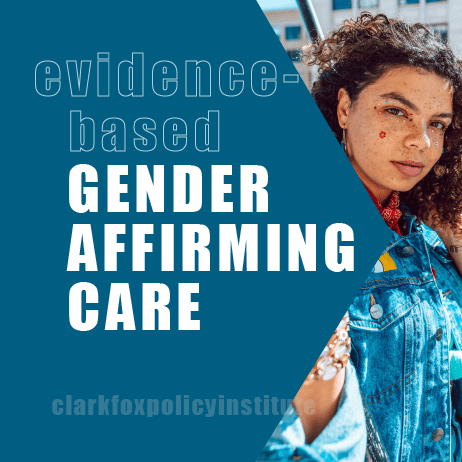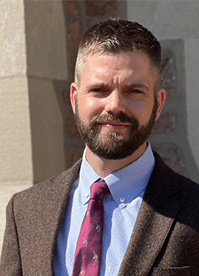The views expressed are solely that of Professor Goldbach and Ms. Dunlap based on their scholarly expertise. It is not an official statement from Washington University.
A recent opinion piece by Jamie Reed titled “I thought I was saving trans kids. Now I’m blowing the whistle” frames itself as an exposé of the Washington University Transgender Center at St. Louis Children’s Hospital, suggesting the program is “morally and medically appalling.” But dig deeper and it becomes clear that this article is filled with the many logical fallacies that plague current popular media coverage of gender-affirming care. These arguments are (mis)used to propagate subjective opinions as objective facts.

The rhetoric follows many common tropes peddled by those who oppose the social affirmation and medical treatment of transgender adolescents and adults. By centering the perspective of only one individual, the article leaves medical and mental health professionals, academics, and most importantly, trans adolescents and their families voiceless while purporting to advocate for them.
First things first: Is this a credible source?
The first question readers should ask when reading the original opinion is whether the writer is a credible source. The author argues they are credible because they are a queer woman, a parent, and “left of Bernie Sanders”; experienced their own gender questioning as a young person; and are married to a transman.
This lived experience gives the author an important perspective, but one that is highly subjective and dependent on things that have personally happened to them. In contrast, they provide only two brief statements about their professional experiences: that they worked with “children in foster care, sexual minorities and the poor” and that they worked as a “case manager – responsible for patient intake and oversight” at the transgender youth clinic.
Although critical to patient navigation, this intake work (gathering information about patients and their family before a meeting with the clinical team) does not give the author the training or expertise to comment on the clinical decisions made by medical doctors, nurses, psychologists, social workers, and others with years of formal clinical training in transgender adolescent health.
To put it more clearly, would you rely on the person checking you in at an emergency room for their medical advice? To triage for urgency, of course. But to determine the course of treatment?
We think not.
If we make it OK to be transgender, will everyone become transgender?
The author makes a dangerous claim that the recent increase in patients reporting dysphoria is connected to nefarious acts by the clinic, seemingly suggesting efforts are being made to push youth toward being transgender when they really aren’t. They further assert a conspiracy theory that providing templates to outside providers is an act of collusion to force youth into transition, rather than a routine practice provided in a variety of specialty care settings to ensure that when (and if) a referral is made, the necessary information is clear, appropriate, and complete.
Despite the claim made by the author, there is no evidence for the “floodgates” being opened. Instead, research suggests that many trans youth continue to face significant barriers to accessing gender-affirming care, including barriers related to insufficient health insurance coverage, high costs of care, discrimination from medical providers in primary and secondary care, limited availability of knowledgeable providers, and more recently, fear of punitive retaliation in communities that police gender-affirming care for children and adolescents.
And, this inability to access care is strikingly harmful. Study after study report the significant challenges transgender youth face related to depression, suicidality, and self-harm; victimization in schools; and the inability to obtain affirming medical care. In fact, suicide attempts among transgender youth range from 17% to 51% across recent studies, particularly in the absence of social and medical affirmation. And without a doubt, COVID-19 has exacerbated health and mental health disparities, including access to social support, for transgender youth.
Research shows that gender-affirming health care is a lifeline for transgender youth, and children who are supported in their identities report depression and anxiety outcomes quite similar to their peers. How the author neglected to provide readers with access to the many studies that show this is ignorant at best and deceptive and dangerous at worst.
But what about the side effects?
Perhaps the most concerning statement in this op-ed is that “there are no reliable studies showing” that if left untreated, gender dysphoria has consequences including self-harm and suicide. Indeed, numerous studies (including those we have already noted) do show that access to affirming care reduces behavioral health problems among transgender youth. For example, a recent study found that on average, youth who receive gender-affirming care report 60% lower odds of moderate or severe depression and 74% lower odds of suicidality in the past year. Another study published in JAMA Surgery found that transgender people who receive care have a 42% reduction in psychological distress and a 44% reduction in past-year suicidal ideation. They also found a significant reduction in the odds of every adverse mental and behavioral health outcome they examined, including suicide attempt, binge drinking, and tobacco use.
It is true – all medical interventions and medications have side effects. Indeed, the author provides an example of a provider recognizing that a young person and their family do not understand the effects of a certain drug while discussing whether to begin treatment and
discussing pausing to ensure they do. This is exactly how the system is intended to work. What does the author expect?
Are families being excluded from decisions?
First, the age of legal adulthood in Missouri, like other states, is 18. Thus, with rare exception, parents or legal guardians must engage in an informed consent processes with medical or mental health providers for their child to access care, including the provision of puberty blockers and hormones.
Additionally, the challenges of parents and family members are immense, as a recent documentary by Vice News explores. In addition to tension between parents, many parents of trans youth undergo feelings of loss as they detach from their idea of their child’s identity,
perhaps even holding themselves responsible.
As the author notes, parents do not always agree on the best path forward for their child’s care. But this is not unique to gender-affirming services; disagreements between parents lead to complicated decisions regarding many physical and behavioral health concerns. Documenting their pain does not serve as a justification to end affirming care, it simply highlights the confusion, parental discord and hesitation that parents face as they make important, time sensitive and often life-saving decisions related to their children’s health and well-being.
Do transgender people often regret their decision?
Another assertion of the opinion piece is that transition-related regret is common and should be a rationale for not providing care.
Yet the research on this is also clear. A recent analysis of 27 studies involving 7,928 transgender patients found that less than 1% of transmasculine patients and only 1% of transfeminine patients report feeling regret after gender-affirmation surgery. The rhetoric that people commonly regret their decisions is patently false.
So, should we close the clinics?
The author’s closing argument is that transgender youth clinics are experimenting with care that is being forced on children. They ask that you trust their opinion over the science-based reports of the American Academy of Pediatrics and the American Academy of Child and Adolescent Psychiatry and the medical and mental health professional community. Perhaps even more importantly, they ask that you take the opinion of an intake coordinator with no specialized training as authority without providing the testimony of a single trans youth or family member that have relied on the clinic’s gender affirming care since its inception.
The author is correct about exactly one thing: The lives of trans kids are at stake. We urge readers to rely on the best available scientific literature rather than exploitive generalizations. Although we do not speak for trans adolescents and their parents, we present what we have learned from experts who have dedicated their professional careers to building knowledge related to understanding and supporting the mental health, health, and well-being of trans youth.
And together that evidence shows resoundingly that gender-affirming clinics like the one at Washington University must stay open, because they are critical to saving lives in this highly vulnerable population of young people.
Masters & Johnson Distinguished Professor in Sexual Health and Education
Washington University in St. Louis
UCLA Luskin School of Public Affairs, Department of Social Welfare
University of California Los Angeles

